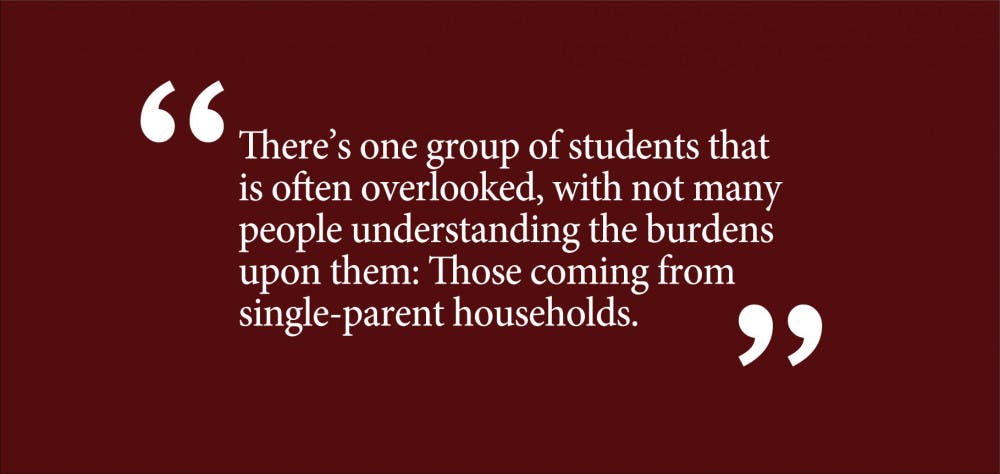An amazing opportunity for Brown students is the exposure to people from a variety of cultures and backgrounds and getting to learn from their experiences. But there’s a group of students that is often overlooked, with not many people understanding the burdens upon them: those coming from single-parent households — who have only one parent in their lives. These students and their plights often go unnoticed at Brown and in the Ivy League community at large.
The psychological and communal impact of a single-parent household goes beyond having only one parent come for Family Weekend or watching friends and peers show both of their parents around campus. Having one parent’s income to fall back on and working to pay off loans can be an overwhelming burden. Yet these struggles extend beyond economic factors and can have a significant impact on mental health. According to a 2006 U.K. study on childhood mental illness and divorce conducted by the Office for National Statistics, 13 percent of girls who had a divorced or widowed parent had a mental disorder, compared to 5 percent of girls whose parents were still together. The statistics for boys in the study echoed a similar trend: Almost 20 percent of boys living with a single parent had similar experiences with mental illness, compared to 8 percent of boys coming from a two-parent household. In addition, numerous studies have shown how students from divorced families are educationally disadvantaged and less likely to pursue higher education.
Students from single-parent households face specific challenges in the college application process. If they have big dreams of attending a top university, like an Ivy League school, to further their education, the odds are stacked even further against them. A study conducted by researchers at Cornell in 1996 showed that children whose parents are divorced are only half as likely to attend a top, selective school compared to those coming from a two-parent background. The same study also showed that in a class at Cornell, only 10 percent of the student body was from a single-parent household, compared to the national divorce rate at the time of roughly 50 percent. There are a variety of factors that help explain the disproportionately low number of students from divorced families who attain college degrees — from lower average test scores to a decreased likelihood of participating in extracurriculars.
Given so many socioeconomic factors that students from single-parent households face, it is astounding these students, myself included, were able to attend elite universities. I remember when I first came to Brown, I grazed my palm over the Gate and all of its gilded years, in awe that despite all I had faced in my childhood, I was still graced with the opportunity to attend one of the top institutions in the world. My mother always reminded me of where I came from — an only child from a household that was torn apart when I was just nine years old. I was supposed to “become a statistic,” as she put it, and never go as far as I, and my peers who have come from a similar background, have gone.
And yet, it seems as though not many people in the Brown community talk about this struggle. Child support and parental income are factored into financial aid packages, but awareness and understanding of the plight of those who have made it here despite all odds are lacking. Because of the small proportion of students from divorced households coming into the Ivy League and into the Brown community, thinking about the struggles these students face can be out of sight and out of mind for the majority of the community. But, especially in a community in which students from the top 1 percent outnumber those from the bottom 60, acknowledging the adversity faced by students who have only one parent in their lives is essential to erase the isolation students from single-parent households may feel. Their struggles should not be invisible, and they should be proud that in spite of everything, they are still standing and thriving at a top university.
Rachael Schmidt ’21 can be reached at rachael_schmidt@brown.edu. Please send responses to this opinion to letters@browndailyherald.com and other op-eds to opinions@browndailyherald.com.





